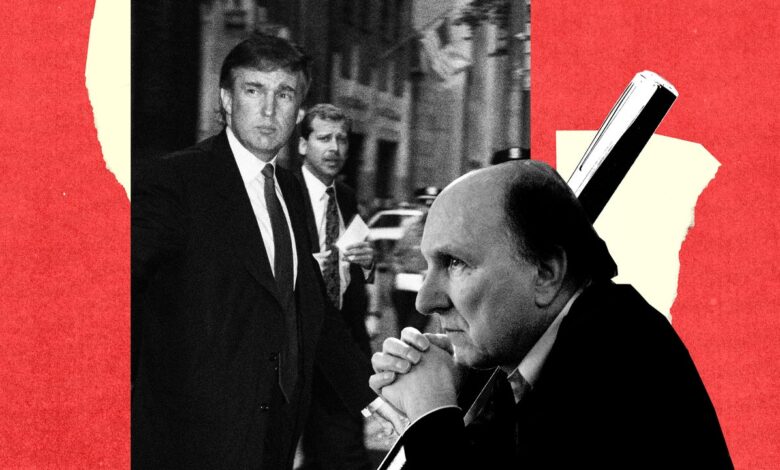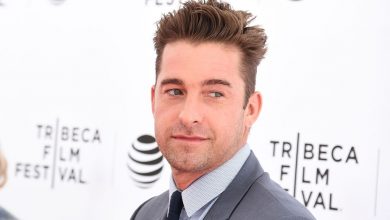A Brief Oral History of Wayne Barrett, the First Journalist to Doggedly Cover Donald Trump

Long before he became president, Donald Trump was doggedly covered by the Village Voice, the New York City alternative newspaper founded in 1955 by Norman Mailer, Ed Fancher, and Dan Wolf. Trump’s nemesis at the Voice was a tall, gangly reporter, who had first started writing as a freelancer for the paper in the early seventies, named Wayne Barrett. When he narrowed onto a subject, Barrett’s devotion to uncovering truth was unwavering: He once told a classroom that he was “a detective for the people.” Over his 37-year career at the Voice, Barrett hounded New York’s most powerful figures—including Rudy Giuliani, then the United States Attorney for the Southern District of New York, and later the mayor of the city; Governors Mario and Andrew Cuomo; and Senator Al D’Amato, who once called Barrett “a viper.” (Barrett’s response: “I want it on my tombstone.”)
But his most sensational subject would turn out to be Donald Trump, then a fledgling real estate magnate working under the tutelage of his better-known father, Fred Trump. In the late seventies through the eighties and nineties, Trump would become a flashy figure in high society, much to the benefit of gossip columnists and, of course, his own public profile. But Barrett knew better, and his first investigative series for the Voice revealed the slimier side of Trump’s playbook for years to come.
After he was laid off by the Voice in 2011, Barrett continued writing for the Daily Beast and other outlets. And when Trump ran for president in 2015, Barrett’s reporting proved to be more prescient than anyone could have predicted. Barrett, a nonsmoker by then ailing from interstitial lung disease and lung cancer, was ensconced in his Windsor Terrace, Brooklyn home, frantically writing as his time on earth ran out. Reporters trekked to his house to salvage his files, now more valuable than ever; his 1991 biography of Trump, a treasure trove of Trump’s wheeling and dealing, was reprinted in 2016 as “Trump: The Greatest Show on Earth: The Deals, the Downfall, the Reinvention in 2016.”
On the night of the 2016 election, he watched the results with his wife and son, and former Voice colleague Tom Robbins, aghast as the man he had exposed as a con and a grifter for decades was elected president. Barrett never finished his investigations: he died the night before Trump’s inauguration, the only small mercy being that he wouldn’t be alive to watch the next four years to come.
“You should check out this young guy Donald Trump”
WAYNE BARRETT: When I started, in the ’70s, Trump was this golden boy, and he had not had much press, but it had all been very supportive because he was doing the Grand Hyatt, which was his first big project in Manhattan. And the city was down in the dumps, near broke during the ’70s, and he looked like the embodiment of a rising city. And he was getting that kind of press, though not much of it.
I worked on him intensely in ’78 while the Hyatt was under construction, had not been completed yet. And that’s when I first got to know him.
TIMOTHY L. O’BRIEN: He had gotten the idea to report on him from Jack Newfield. He had asked Jack for advice on who would be a good person to write about, who is emblematic of the intersection of real estate money and politics and power in New York. And Jack said, “You should check out this young guy Donald Trump.”
TOM ROBBINS: Jack had a canny eye for these operators. Jack’s famous book was The Permanent Government. He believed that there were all these characters who had nothing to do with getting elected or unelected but who stayed in power in the city, regardless. He spotted Donald Trump right away as a budding member of that tribe.
TIMOTHY L. O’BRIEN: Wayne would always talk about how he felt that they had parallel lives in New York. They were almost the same age, and Trump was on the ascent to be a real estate developer at the same time that Wayne was ascending as an investigative reporter in New York.
Wayne began looking into the family history. He was at one of the city archives, and he’s in a room looking at documents. There’s a phone in there, and the phone rings.
WAYNE BARRETT: I didn’t know whether to pick up or not. “Wayne! It’s Donald! I hear you’re doing a story on me!” I’d never talked to the guy in my life. When he found out I lived in the battered Brownsville section of Brooklyn, he called to say, “I could get you an apartment, you know. That must be an awfully tough neighborhood.” I told him I’d lived there for ten years and worked as a community organizer, so he shifted to another form of identification. “So, we do the same thing,” he said. “We’re both rebuilding neighborhoods.” And again: “We’re going to have to really get to know each other after this article.”
ROBIN REISIG: Trump called him up shortly after he had started reporting and invited him to meet. Wayne did and realized it was a mistake: He didn’t know what to ask. He had just started reporting. Of course, by the time he finished reporting Trump didn’t want to meet with him anymore.
WAYNE BARRETT: I met with Trump several times over the next few months, taping fifteen hours of energetic monologue, riding with him in his limo, and relaxing through expansive interviews on his penthouse couch. One interview was cut short when Ivana insisted that a grumbling Donald go to the opera with her.
I decided at the start that I wanted to profile him by describing his deals—not his lifestyle or his personality. After getting to know him, I realized that his deals are his life. He once told me, “I won’t make a deal just to make a profit. It has to have flair.”




